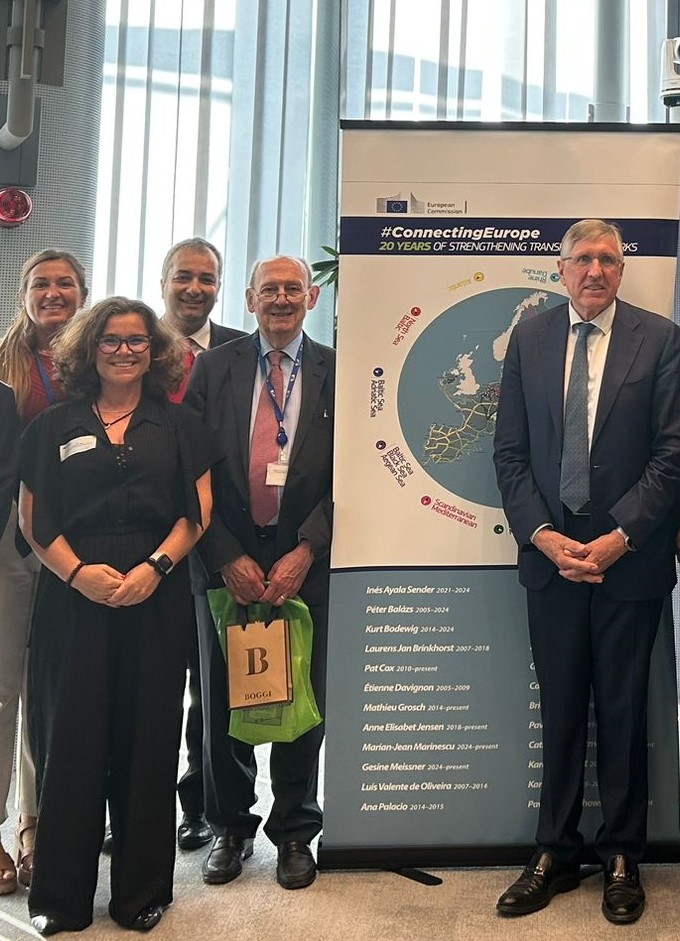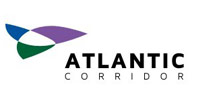Meetings
2nd Meeting of the Atlantic European Transport Corridor Forum
Brussels, June 24th 2025 - The 2nd Meeting of the Atlantic European Transport Corridor Forum was held, promoted by the European Commission within the context of Trans-European Transport Network (TEN-T).

The event was presided over by the European Coordinator for TEN-T Atlantic Corridor, Professor Carlo Secchi, and was marked by the presentation of the new European plan for the development of high-speed railway, the discussion about the adaptation of infrastructure to climate change, and the alignment of investment priorities with the new TEN-T regulation. The management board of RFC Atlantic was represented by Christiane Warnecke, from DB Infra Go, and Rita Veiga, from IP.
Highlights
During the Forum, strategic questions regarding sustainable development and the resilience of European mobility were asked, with special regard for rail freight transport in the Atlantic Corridor, namely:
- The monitoring of Key Performance Indicators (KPI) in rail freight transport, with special focus on the Atlantic Rail Freight Corridor (RFC ATL), including the analysis of dwell times in border crossings and train punctuality on arrival. These metrics are crucial to guarantee a more efficient, competitive rail transport and alignment with European Union modal transfer objectives;
- The update of the list of projects of the Atlantic Corridor for 2025, which totals 187 evaluated projects, with the rail sector prevailing. The estimated total investment is of 86,7 billion euros, in which 74,9 of them are directed towards rail;
- The presentation of the European Commission Communication regarding the high-speed European network, which highlights the need for an investment above 345 billion euros until 2030, including cost reduction measures, debated in the workshop held in Madrid. Though focused on passenger traffic, this strategy has direct impacts on interoperability and infrastructure sharing with freight traffic;
- The reinforcement of climate resilience on TEN-T infrastructure, based on a study published by the European Commission and work developed by the shared work group with the Mediterranean Corridor, which strives to protect critical infrastructure from the effects of climate change, including the infrastructure serving freight rail;
- The integration of military mobility needs in the civilian infrastructure planning, in regard to the ReArm Europe plan and the Defense White Paper, with special attention being provided to strategic corridors which serve freight traffic;
- The presentation of the European market study led by RailNetEurope, with the Atlantic Corridor being of note, whose objective is to substantiate strategic capacity planning decisions, reinforcing the need for freight efficient rail network on a European scale.
New Atlantic Corridor European Coordinator

The Forum also counted with the presentation of the new European Coordinator for the Atlantic Rail Freight Corridor, François Bausch. His experience in linear infrastructure development and his commitment to railway development – at both a national and European level – make him an ideal candidate to guide the implementation of the Atlantic Corridor.
This was also the opportunity to recognise the important work developed by Professor Carlo Secchi, the current European Coordinator for the Atlantic Corridor. Under his leadership, several impactful iniciatives were fostered, which reenforced the spirit of European cooperation, such as the Technical Joint Workshop on International Passenger and Freight Traffic in the TEN-T, the Atlantic and Mediterranean European Transport Corridors Working Group for Climate Resilience and the Workshop for High-Speed Railway Construction Cost Lowering.







